Enhanced TDS
Identification & Functionality
- Additives Included
- Blend
- Yes
- Chemical Family
- Function
- Resin
- Plastics & Elastomers Functions
- Polymer Name
- Product Code
- MITM14918
- Single Ingredient
- No
- Technologies
- Product Families
Features & Benefits
- Labeling Claims
- Materials Features
Applications & Uses
- Plastics & Elastomers Processing Methods
- Markets
- Applications
- Processing Information
Injection Molding
- Typical melt temperature (Min / Recommended / Max) : 250°C / 270°C / 290°C.
- Mold temperature : 40 - 90°C
- Drying time and temperature (only necessary for bags opened for more than two hours) : 4-6 hours at 80-90°C.
Properties
- Physical Form
Technical Details & Test Data
- Technical Data
Viscosity-shear Rate
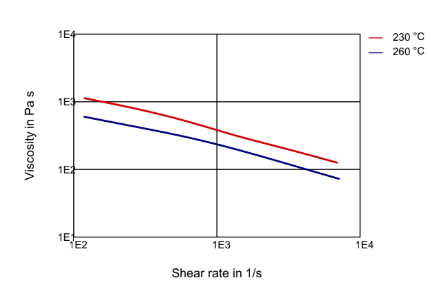
Shearstress-shear Rate
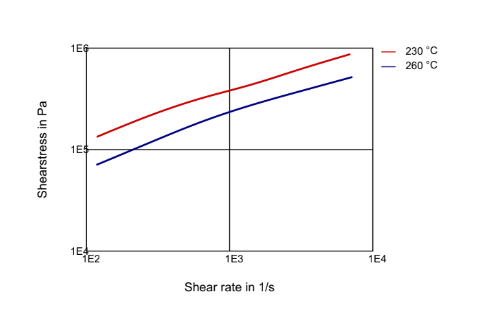
Dynamic Shear Modulus-temperature
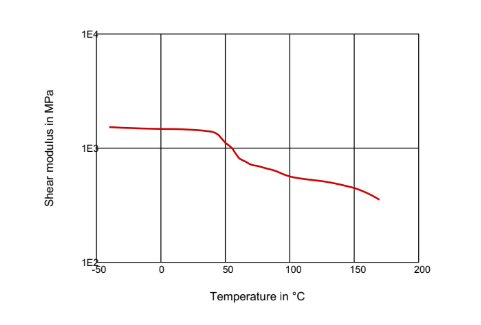
Stress-strain
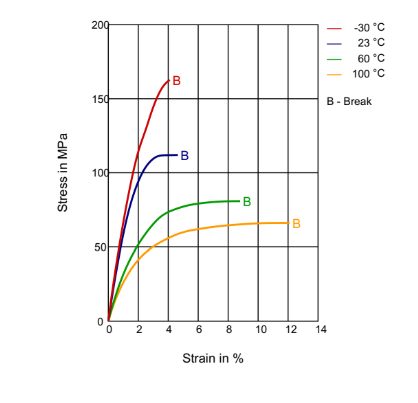
Secant Modulus-strain
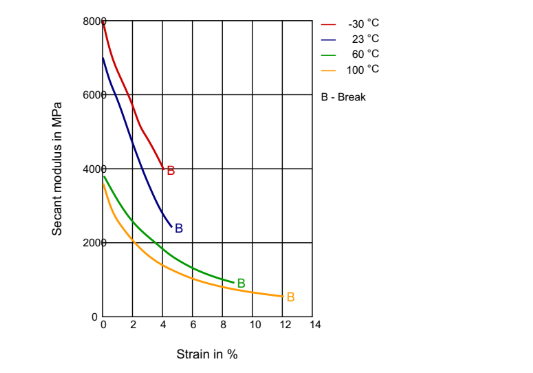
Packaging & Availability
- Packaging Type
Principal Information
- Group Principal Number
- S000003
- Principal
Other
- Color (SDS)
- Black
- Insoluble in (SDS)
- Water
- Item Number
- Other Hazards
- Processing may release vapors and/or fumes which cause eye, skin and respiratory tract irritation, Prolonged or repeated exposure may cause: headache, drowsiness, nausea, weakness, (severity of effects depends on extent of exposure).
- Temperature Control
- Yes
- USA/DOT UN Number
- Not Applicable
- Electrical Properties
Value Units Test Method / Conditions Comparative Tracking Index 300.0 - IEC 60112 Dielectric Constant 5.0 - IEC 60250 at 100 Hz, dry Dielectric Constant 5.0 - IEC 60250 at 1MHz, dry Dielectric Strength 22.0 kV/mm kV/mm IEC 60243-1 Dissipation Factor 0.0334 tan δ tan δ IEC 60250 100Hz, dry Surface Resistance 6000000000000.0 Ω Ω IEC 60093 Volume Resistivity 200000000000.0 Ω-cm Ω-cm IEC 60093 - Mechanical Properties
Value Units Test Method / Conditions Charpy Impact Strength 74.0 - DIN EN ISO 179-1 at 23°C, dry Charpy Impact Strength 83.0 - DIN EN ISO 179-1 at -30°C, condensed Charpy Impact Strength 13.0 - ISO 179-1EA at 23°C, dry, notched Charpy Impact Strength 10.0 - ISO 179-1EA at -30°C, dry, notched Hardness 74.0 - at 15 sec Hardness 74.0 - ISO 868 at 15 sec Strain at Break 5.0 - ISO 527-1 at break, condensed Strain at Break 5.0 - ISO 527-1 Dry, at break Strain at Break 5.0 - ISO 527-2 at break, condensed Strain at Break 5.0 - ISO 527-2 Dry, at break Stress at Break 108.0 MPa MPa ISO 527-1 at break, condensed Stress at Break 108.0 MPa MPa ISO 527-2 at break, condensed Tensile Modulus 2020.0 MPa MPa ISO 527-1 condensed Tensile Modulus 6100.0 MPa MPa ISO 527-1 dry basis Tensile Modulus 2020.0 MPa MPa ISO 527-2 condensed Tensile Modulus 6100.0 MPa MPa ISO 527-2 dry basis - Physical Properties
Value Units Test Method / Conditions Density 1.0 g/cm³ g/cm³ ISO 1183 condensed Density 1220.0 - ISO 1183 dry basis Load/Unload Temperature 178.0 °C °C ISO 75-1 at 0.45 MPa, dry, deflection under load Load/Unload Temperature 170.0 °C °C ISO 75-1 at 1.80 MPa, dry, deflection under load Load/Unload Temperature 178.0 °C °C ISO 75-2 at 0.45 MPa, dry, deflection under load Load/Unload Temperature 170.0 °C °C ISO 75-2 at 1.80 MPa, dry, deflection under load Melt Volume-Flow Rate 9.0 cc/10min cc/10min ISO 1133 at 235°C, 5 kg Melting Point 186.0 °C °C ISO 11357-3 at 10°C/min Melting Point 186.0 °C °C ISO 11357-1 at 10°C/min Softening Point 170.0 °C °C ISO 306 at 50°C/h, 50N, dry Storage Temperature max. 140.0 °F °F Water Absorption 1.2 % % ISO 62 at 23°C, dry - SDS Physical and Chemical Properties
Value Units Test Method / Conditions Autoignition Temperature (SDS) 788.0-842.0 °F °F Decomposition Temperature (SDS) min. 662.0 °F °F Lower Explosion Limit (SDS) 86.0 % % at 85⁰C Melting Point (SDS) 361.0-369.0 °F °F - Shelf Life & Stability
Value Units Test Method / Conditions Shelf Life 2.0 - - Thermal Properties
Value Units Test Method / Conditions Coefficient of Thermal Expansion 0.00005 /K /K ISO 11359-1 parallel, dry Coefficient of Thermal Expansion 0.00005 /K /K ISO 11359-2 parallel, dry
